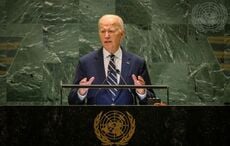Boston College: Enda Kenny, Ireland’s Taoiseach (Prime Minister), will give the Commencement Address to Boston College’s 4,400 graduates at Alumni Stadium this morning.
In the three years since coming to power, Kenny has looked to build a “Republic of laws,” a Republic that many Irish expatriates in the US—myself included—identify with because it closely mirrors the society in which we now live, a society where the letter of the law rather than the unspoken assumption of a doctrinaire moral code determines social policy.
Savita Halappanavar is a victim of that moral code and social policy. Mrs. Halappanavar died of sepsis, an infection brought on by the miscarriage of her seventeen-week pregnancy, in a Galway hospital on 28th October 2012. Her grieving husband described the medical treatment meted out to his wife as “horrendous, barbaric and inhumane.” To read the “Timeline” of his wife’s eight-day ordeal, based on evidence presented at the week-long official inquest, induces shame and anger. A young healthy woman fell victim to a lack of political will.
Enda Kenny outlined his vision for a very different Ireland during a Dáil Éireann speech in July 2011 when responding to the publication of the Cloyne Report. Like earlier reports—Murphy, Ryan, and Ferns—Cloyne echoed the well established narrative of clerical child sex abuse and confirmed the Catholic hierarchy’s failure to report such abuse to the civic authorities. The Bishop in question observed the dictates of the Vatican rather than the law of the land.
But Cloyne was of a different order too. It detailed how the Vatican deliberately organized to frustrate an Irish State-commissioned inquiry into clerical child sex abuse as recently as 2009. In an unprecedented move, Mr. Kenny, a devout Catholic, entered the Dáil chamber, the seat of political power in Ireland, and called the Vatican to account. And, he declared the primacy of the State’s standards, not those of the Catholic Church, in all matters related to the protection of Ireland’s children.
The “Cloyne speech” represents a watershed moment because it encapsulates a new vision for the nation:
This is the Republic of Ireland 2011. A republic of laws, of rights and responsibilities; of proper civic order; where the delinquency and arrogance of a particular version, of a particular kind of ‘morality,’ will no longer be tolerated or ignored.
That “version … of morality” for too long masked a history of collective abdication of responsibility for Ireland’s most vulnerable citizens. It fed the open secret of abuse, abandonment and neglect in Irish society as nation and State looked the other way and chose not to see what we all knew happened in our midst. Mr. Kenny drew a line under that history.
In November 2012, Mr. Kenny delivered on his promise to “protect the sacred space of childhood and to restore its innocence.” The electorate exercised its democratic right in a national referendum and amended Ireland’s constitution to include, for the first time, an article “recognize[ing] and affirm[ing] the natural and imprescriptible rights of all children.” His government also passed into law the Criminal Justice (Withholding of Information on Offences Against Children and Vulnerable Persons) Act, 2012, which among other things makes it no longer acceptable for a priest to claim the sanctity of the confessional seal in cases related to child abuse.
Earlier this spring, the Taoiseach offered the long-awaited official apology to survivors of Ireland’s Magdalene Laundries—women victimized by the same moral code. The apology was heartfelt and sincere. On this occasion too Mr. Kenny imagined an Irish society characterized by compassion, empathy, and social justice. And, he charged members of the public with the obligation to learn the lessons of the past and to help ensure no repetition in the present or future.
The Cloyne speech and the Magdalene Apology signal Enda Kenny’s willingness to confront Ireland’s history, learn from past mistakes, and legislate for the lived realities of Ireland present. Both speeches inform his decision to sponsor the “Protection of Life During Pregnancy Bill, 2013”—the pending legislation that makes his choice as Boston College’s commencement speaker controversial.
Ireland’s constitutional ban on abortion remains unchanged by the proposed legislation. Article 40.3.3° reads: “the State acknowledges the right to life of the unborn and, with due regard to the equal right to life of the mother, guarantees in its laws to respect, and, as far as practicable, by its laws to defend and vindicate that right.” Abortion is banned in any circumstances beyond those where it is judged that there is a real and substantial risk to the life of the mother, which puts the life of the unborn child equally at risk.
The proposed legislation will, however, provide legal clarity for members of the medical profession, in instances where there is a so-called “real and substantial” risk to the life of the mother and therefore the life of the unborn child as well. Decisions of Ireland’s Supreme Court, as far back as 1992, and the European Court of Human Rights, as recently as 2011, have required successive governments to legislate on this matter. Enda Kenny’s government is the first to do so. If successful, his “Republic of laws” will be one step closer.
James M. Smith is an associate professor in the English Department at Boston College. He is the author of Ireland’s Magdalen Laundries and the Nation’s Architecture of Containment (University of Notre Dame Press, 2007).




Comments